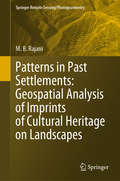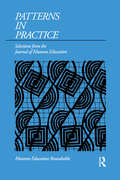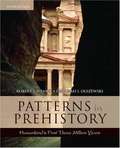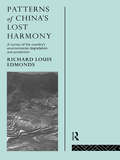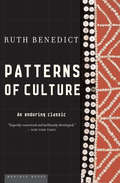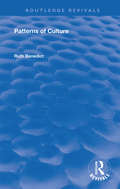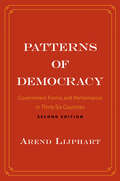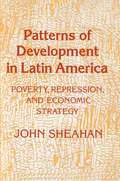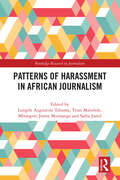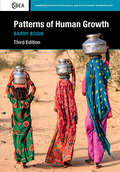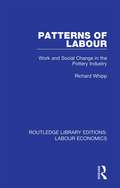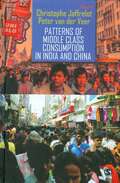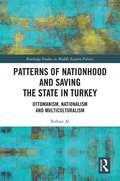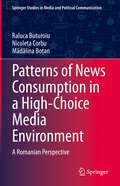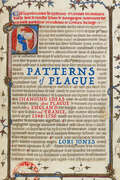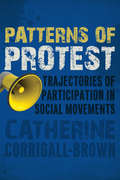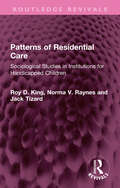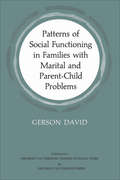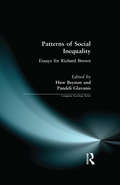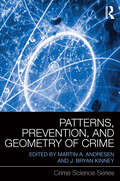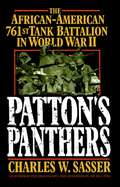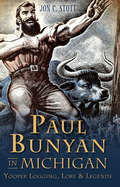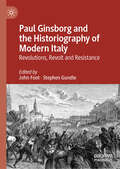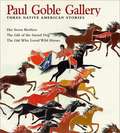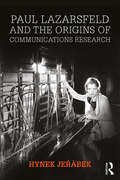- Table View
- List View
Patterns in Past Settlements: Geospatial Analysis of Imprints of Cultural Heritage on Landscapes (Springer Remote Sensing/Photogrammetry)
by M.B. RajaniThis book is an introduction to a new branch of archaeology that scrutinises landscapes to find evidence of past human activity. Such evidence can be hard to detect at ground-level, but may be visible in remote sensing (RS) imagery from aerial platforms and satellites. Drawing on examples from around the world as well as from her own research work on archaeological sites in India (including Nalanda, Agra, Srirangapatna, Talakadu, and Mahabalipuram), the author presents a systematic process for integrating this information with historical spatial records such as old maps, paintings, and field surveys using Geographic Information Systems (GIS) to gain new insights into our past. Further, the book highlights several instances where these insights are actionable -- they have been used to identify, understand, conserve, and protect the fragile remnants of our past. This book will be of particular interest not only to researchers in archaeology, history, art history, and allied fields, but to governmental and non-governmental professionals working in cultural heritage protection and conservation.
Patterns in Practice: Selections from the Journal of Museum Education
by Susan K. NicholsThis comprehensive anthology features 47 selected articles from the Journal of Museum Education plus ten new introductory essays by leaders in museum education and related fields. The articles and essays explore some of the fundamental issues concerning the role of education in museums today, from serving diverse communities to motivating visitors in an informal learning setting. The book is divided into five sections which 1) trace the evolution of the museum education profession; 2) explore the field's theoretical base; 3) consider methods of research used; 4) provide examples of how theory is translated into practice; and 5) summarize issues relating to professional development. Sponsored by the Museum Education Roundtable
Patterns in Prehistory: Human kinds First Three Million Years
by Deborah I. Olszewski Robert J. WenkeThe origins and evolution of culture, The origins of modern humans and human behaviors, The origins of agriculture and the origins of complex societies, civilizations, and pre-industrial states. It reveals how archaeologists decipher the past. It demonstrates how theory and method are combined to derive interpretations and also considers how interpretations evolve as a result of accumulating data, technological advances in recording and analyzing data sets, and newer theoretical perspectives.
Patterns of China's Lost Harmony: A Survey of the Country's Environmental Degradation and Protection
by Richard Louis EdmondsThe pace of environmental degradation in China has intensified in recent decades. With rapid demographic and economic growth, the current state of degradation has antecedents beginning hundreds of years ago. Patterns of China's Lost Harmony combines historical documentation with contemporary assessment to determine the degree of human impact upon the country's vegetation, soils, water, air and wildlife. This will serve as an important reference tool for understanding the historical scope of environmental degradation and for assessing attempts to control environmental degradation since the 1980s.
Patterns of Culture: An Enduring Classic
by Ruth BenedictAn anthropologist compares three diverse societies in this groundbreaking, &“unique and important&” cultural study (The New York Times). A remarkable introduction to cultural studies, Patterns of Culture made history in exploring the role of culture in shaping our lives. In it, the renowned anthropologist Ruth Benedict offers an in-depth look at three societies—the Zuñi of the southwestern United States, the Kwakiutl of western Canada, and the Dobuans of Melanesia—and demonstrates the diversity of behaviors in them. Benedict&’s groundbreaking study shows that a unique configuration of traits defines each human culture and she examines the relationship between culture and the individual. Featuring prefatory remarks by Franz Boas, Margaret Mead, and Louise Lamphere, who calls it &“a foundational text in teaching us the value of diversity,&” this provocative work ultimately explores what it means to be human. &“That today the modern world is on such easy terms with the concept of culture . . . is in very great part due to this book.&” —Margaret Mead
Patterns of Culture: Patterns Of Japanese Culture (Routledge Revivals)
by Ruth BenedictThis book was originally published in 1935. For some years past the scientific study of primitive peoples has experimented in a variety of directions for new methods of investigation. Criticism of the comparative method, of which Sir James Frazer is recognized as the foremost exponent all the world over, has been directed mainly against the fragmentary character of its evidence when torn from its context. In this book Dr Benedict offers an alternative method of approach. The aim of the investigator, she maintains, should be the discovery in the diversity of cultures of the 'configuration' of each - that is the cultural drive in group and individual which determines the characteristic reaction to stimulus in any and every situation in life.
Patterns of Democracy
by Arend LijphartIn this updated and expanded edition of his highly acclaimed book Democracies, Arend Lijphart offers a broader and deeper analysis of worldwide democratic institutions than ever before. Examining thirty-six democracies during the half-century from 1945 to 1996, Lijphart arrives at important -- and unexpected -- conclusions about what type of democracy works best. While conventional wisdom suggests that majoritarian democracies like those in the United States and Great Britain are superior to consensual systems like those in Switzerland and Israel, Lijphart shows this is not so. In fact, consensual systems stimulate economic growth, control inflation and unemployment, and limit budget deficits just as well as majoritarian democracies do. And, consensus democracies clearly outperform majoritarian systems on measures of political equality, women's representation, citizen participation in elections, and proximity between government policies and voter preferences. Systematically comparing cabinets, legislatures, parties, election systems, supreme courts, and -- for the first time in this volume -- interest groups and central banks, Lijphart demonstrates that the more consensual a democracy, the "kinder and gentler" it is when addressing welfare, environmental, criminal justice, and foreign aid issues. These findings are of far-reaching import not only for countries designing their first democratic constitutions but also for established democracies seeking practical approaches to reform.
Patterns of Development in Latin America: Poverty, Repression, and Economic Strategy
by John SheahanIn this major work an economist with long experience as an advisor in developing countries explores the conflict between market forces and political reform that has led straight into Latin America's most serious problems. John Sheahan addresses three central concerns: the persistence of poverty in Latin American countries despite rising national incomes, the connection between economic troubles and political repression, and the relationships between Latin America and the rest of the world in trade and finance, as well as overall dependence. His comprehensive explanation of why many Latin Americans identify open political systems with frustration and economic breakdown will interest not only economists but also a broad range of other social scientists. This is "political economy" in the classical sense of the word, establishing a clear connection between the political and economic realities of Latin America.
Patterns of Harassment in African Journalism (Routledge Research in Journalism)
by Sadia Jamil Trust Matsilele Lungile Augustine Tshuma Mbongeni Jonny MsimangaThis volume examines the trends and patterns of journalists’ harassment in Africa and assesses the policy interventions and protection mechanisms that are put into place in the region.Drawing from case studies from selected African countries, an international team of authors offer a broad insight into the state of harassment across the continent, while building new theoretical perspectives that are also context-specific. The chapters bring previous theories and research up to date by addressing the continual change and development of new discourses, including the use of big data and artificial intelligence in harassing and intimidating journalists and mental health issues affecting journalists in their line of duty. More so, the authors argue that the state and form of harassment is not universal, as location and context are some of the key factors that influence the form and character of harassment.Offering new theoretical insights into the scope of journalism practices in Africa, this book will interest students and scholars of journalism, African studies, political science, media and communication studies, journalism practice and gender studies.
Patterns of Human Growth (Cambridge Studies in Biological and Evolutionary Anthropology #23)
by Barry BoginThis completely revised edition provides a synthesis of the forces that shaped the evolution of the human growth pattern, the biocultural factors that direct its expression, the intrinsic and extrinsic factors that regulate individual development, and the biomathematical approaches needed to analyze and interpret human growth. After covering the history, philosophy and biological principles of human development, the book turns to the evolution of the human life cycle. Later chapters explore the physiological, environmental and cultural reasons for population variation in growth, and the genetic and endocrine factors that regulate individual development. Using numerous historical and cultural examples, social-economic-political-economic forces are also discussed. A new chapter introduces controversial concepts of community effects and strategic growth adjustments, and the author then integrates all this information into a truly interactive biocultural model of human development. This remains the primary text for students of human growth in anthropology, psychology, public health and education.
Patterns of Labour: Work and Social Change in the Pottery Industry (Routledge Library Editions: Labour Economics #13)
by Richard WhippFirst published in 1990. Patterns of Labour explores the interaction between home, paid work, and the individual. It looks at how the social relations of work both shape and are shaped by the context in which they occur. In a detailed examination of the pottery industries of Britain and America over two centuries, Richard Whipp looks at the far-reaching effects of key issues, such as industrialisation and economic transformation. However, he also examines changing notions of gender, the family, community and unionisation. The book centres on the difficulties of organising, controlling and describing work – not least because of the human act of its making.
Patterns of Middle Class Consumption in India and China
by Christophe Jaffrelot Peter van der VeerPatterns of Middle Class Consumption in India and China explores the complex history and sociology of the middle class from a comparative perspective. It has papers written by sociologists, anthropologists and political scientists rather than economists, so the emphasis is on cultural shifts rather than economic statistics.The major contribution of this volume is that these two emerging powers of Asia are not, as is usual, compared to the West, but with each other. Considering that these two societies have so much in common in scale, civilization history and as emerging economies, the book is timely. The focus of the book is on the social and political implications of the new consumption patterns among the middle classes of India and China in the context of economic growth, liberalization of markets and globalization. Reflecting upon and critically engaging with the traditional sociological notions on which definitions of the middle class have been based, the book analyzes the intermingling of these notions with new attitudes in the wake of the consumer revolution. More specifically, an entire gamut of aspects of the consumer culture have been explored-tourism, leisure activities and the entertainment industry (art, Karaoke and soap operas)—as well as the consumption of experiences through these. It is argued that these phenomena have particular Indian and Chinese incarnations, which need to be analyzed in a manner that does not privilege a limited western experience of globalization. With its fresh insights and perspectives, the book will appeal to students of anthropology, sociology, political science, media studies and cultural studies. It will also be useful for market research professionals.
Patterns of Nationhood and Saving the State in Turkey: Ottomanism, Nationalism and Multiculturalism (Routledge Studies in Middle Eastern Politics)
by Serhun AlPatterns of Nationhood and Saving the State in Turkey tackles a theoretical puzzle in understanding the state policy changes toward minorities and nationhood, first by placing the state in the historical context of the international system and second by unpacking the state through analysis of intra-elite competition in relation to the counter-discourses by minority groups within the context of the Ottoman Empire and Turkey. What explains the persistence and change in state policies toward minorities and nationhood? Under what conditions do states change their policies toward minorities? Why do the state elites reconsider the state-minority relations and change government policies toward nationhood? Adopting a comparative-historical analysis, the book unpacks these research questions and builds a theoretical framework by looking at three paradigmatic policy changes: Ottomanism in the mid-19th century, Turkish nationalism in the early 1920s, and multiculturalism in Turkey in the early 2000s. While the book reveals the role of international context, intrastate elite competition, and non-state actors in such policy changes, it argues that state elites adopt either exclusionary or inclusionary policies based on the idea of "survival of the state." The book is primarily an important contribution to studies in ethnicity and nationalism. It is also an essential resource for students and scholars interested in Comparative Politics, Middle East Studies, the Ottoman Empire, and Turkey.
Patterns of News Consumption in a High-Choice Media Environment: A Romanian Perspective (Springer Studies in Media and Political Communication)
by Raluca Buturoiu Nicoleta Corbu Mădălina BoțanBased on a Romanian case study, this book sheds light on the supply and demand of news and information in the current digital era, dominated by unprecedented dramatic changes. In addition to identifying patterns of journalistic reporting and news consumption, the book offers a thorough approach to how the classic theories in media and communication studies can be reinterpreted in the current attention economy and media abundance paradigm. The research data included in this book provide a snapshot of media consumption patterns and encompass experts’ views and predictions about how media habits and diets might evolve.The book will appeal to students, researchers, and scholars of media and communication studies, political communication, and journalism, as well as practitioners interested in a better understanding of news consumption patterns in a high-choice media environment.
Patterns of Plague: Changing Ideas about Plague in England and France, 1348–1750 (McGill-Queen's/Associated Medical Services Studies in the History of Medicine, Health, and Society)
by Lori JonesFor centuries, recurrent plague outbreaks took a grim toll on populations across Europe and Asia. While medical interventions and treatments did not change significantly from the fourteenth century to the eighteenth century, understandings of where and how plague originated did.Through an innovative reading of medical advice literature produced in England and France, Patterns of Plague explores these changing perceptions across four centuries. When plague appeared in the Mediterranean region in 1348, physicians believed the epidemic’s timing and spread could be explained logically and the disease could be successfully treated. This confidence resulted in the widespread and long-term circulation of plague tracts, which described the causes and signs of the disease, offered advice for preventing infection, and recommended therapies in a largely consistent style. What, where, and especially who was blamed for plague outbreaks changed considerably, however, as political, religious, economic, intellectual, medical, and even publication circumstances evolved.Patterns of Plague sheds light on what was consistent about plague thinking and what was idiosyncratic to particular places and times, revealing the many factors that influence how people understand and respond to epidemic disease.
Patterns of Protest
by Catherine Corrigall-BrownAsked to name an activist, many people think of someone like Cesar Chavez or Rosa Parks—someone uniquely and passionately devoted to a cause. Yet, two-thirds of Americans report having belonged to a social movement, attended a protest, or engaged in some form of contentious political activity. Activism, in other words, is something that the vast majority of people engage in. This book examines these more common experiences to ask how and when people choose to engage with political causes. Corrigall-Brown reveals how individual characteristics and life experiences impact the pathway of participation, illustrating that the context and period in which a person engages are critical. This is the real picture of activism, one in which many people engage, in a multitude of ways and with varying degrees of continuity. This book challenges the current conceptualization of activism and pushes us to more systematically examine the varying ways that individuals participate in contentious politics over their lifetimes.
Patterns of Residential Care: Sociological Studies in Institutions for Handicapped Children (Routledge Revivals)
by Jack Tizard Roy D. King Norma V. RaynesOriginally published in 1971, this title describes a series of studies dealing with the upbringing of children in residential institutions. Most work has been carried out in institutions for children with learning disabilities, although units caring for able but deprived children and children with physical disabilities have also been examined. The investigations have been concerned with the detailed nature of different institutional environments – that is, the routine patterns of daily life in hospital wards, hostels and cottages of children’s homes – rather than with the effects of specific child-rearing practices upon the intellectual, emotional and social development of the children. The more precise delineation of ‘the environment’ is an essential step towards the evaluation of residential services and the interpretation of their effects upon those who use them, yet this is an area which had received little systematic attention from social scientists at the time. This book is a re-issue originally published in 1971. The language used is a reflection of its era and no offence is meant by the Publishers to any reader by this re-publication.
Patterns of Social Functioning in Families with Marital and Parent-Child Problems
by Gerson DavidThe work reported in this book represents the first attempt to study a sample of client families with marital and parent-child problems using a systematic framework based on role-theory. The findings of the study are important and made more so by the consistency of the framework: the dimensions of family behaviour can be accurately studied because the techniques of observation used are constant. This work, conducted under the auspices of the Toronto Family Diagnosis Project, School of Social Work at the University of Toronto, is an impressive contribution to two areas of social work: it offers new observations regarding family life that will be of particular interest to professionals and researchers in the field of family and child welfare, and its technical framework will be of interest to all social workers.
Patterns of Social Inequality: Essays for Richard Brown (Longman Sociology Series)
by Huw Beynon Pandeli GlavanisWritten by a group of the UK's leading Sociologists, this book covers in one volume all of the themes central to an understanding of contemporary British Society. Essays provide an historical overview of such topics as class, gender, work, ethnicity and community but also make a theoretical and substantive contribution to current debates.
Patterns, Prevention, and Geometry of Crime (Crime Science Series)
by Edited by Martin A. Andresen and J. Bryan KinneyP&P Brantingham’s enormous contribution to criminology has paved the way for major theoretical and empirical developments in the understanding of crime and its respective patterns, prevention, and geometry. In this unique collection of original essays, Andresen and Kinney bring together leading scholars in the field of environmental criminology to honour the work of P&P Brantingham with new research on the geometry of crime, patterns in crime and crime generators and attractors. Chapters include new perspectives on the crime mobility triangle, electronic monitoring, illegal drug markets, the patterns of vehicle theft for export, prolific offender patterns,crime rates in hotels and motels, violent crime and juvenile crime. A final chapter gathers together a collection of letters to P&P Brantingham, from key scholars reflecting on and celebrating their important contribution. This volume provides essential readings for those interested in the field of environmental criminology.
Patton's Panthers: The African-American 761st Tank Battalion In World War II
by Charles W. SasserOn the battlefields of World War II, the men of the African American 761st Tank Battalion under General Patton broke through enemy lines with the same courage with which they broke down the racist limitations set upon them by others—proving themselves as tough, reliable, and determined to fight as any tank unit in combat.Beginning in November 1944, the 761st Tank Battalion engaged the enemy for 183 straight days, spearheading many of General Patton's offensives at the Battle of the Bulge and in six European countries. No other unit fought for so long and so hard without respite. The 761st defeated more than 6,000 enemy soldiers, captured thirty towns, liberated Jews from concentration camps—and made history as the first African American armored unit to enter the war. This is the true story of the Black Panthers, who proudly lived up to their motto (Come Out Fighting) and paved the way for African Americans in the U.S. military—while battling against the skepticism and racism of the very people they fought for.
Paul Bunyan in Michigan: Yooper Logging, Lore & Legends (American Legends)
by Jon C. Stott“Gathers the oral traditions of the loggers who settled Michigan’s Upper Peninsula . . . Stott preserves the tall tales for generations to come.” —Grandpa Shorter’s, “Seven Michigan Authors to Put in Your Beach Bag This Summer”The loggers who settled Michigan’s Upper Peninsula whiled away winter evenings with tales of extreme weather, strange geography, legendary beasts and improbable feats. One mythic figure strode confidently from one story to the next, his legend growing with each retelling. Soon, Paul Bunyan began to appear in newspapers, magazines, books and even a Walt Disney cartoon. In this first collection since 1946 set exclusively in the UP, author Jon C. Stott recaptures the oral tradition that cast Bunyan’s shadow across the national imagination. Relive the winter of the blue snow and cross paths with familiar companions like Babe and Johnny Inskslinger, as well as odd creatures like the hodag and the agropelter.
Paul Ginsborg and the Historiography of Modern Italy: Revolutions, Revolt and Resistance
by John Foot Stephen GundleThis book brings together a group of British and Italian scholars who have made significant contributions to the historiography of modern Italy over the last three decades, dedicated to the influence of Paul Ginsborg. Reflecting Ginsborg's interest in the encounter of social and political history in modern Italy, contributions explore the varied forms taken by activism in civil society. Rather than just treating activism and engagement as limited, circumscribed phenomena within a political system, the essays consider these as interventions in the social. Taken together, the contributions gathered here highlight Ginsborg's contributions to scholarship and activism, as well as advancing our understanding of cultural change, institutional reform and the renewal of community in modern Italian history.
Paul Goble Gallery: Three Native American Stories
by Paul GobleA collection of three stories about Native Americans: Her Seven Brothers, The Gift of the Sacred Dog, and The Girl Who Loved Wild Horses.
Paul Lazarsfeld and the Origins of Communications Research
by Hynek JeřábekThe manuscript discusses the early days of communication research, explicitly the first works of Paul Lazarsfeld’s radio and media research in Vienna, Newark, NJ, Princeton and New York during the years between the early 1930s, and the end of the 1940s. Lazarsfeld’s Viennese radio research, especially the world’s first extensive audience research – RAVAG study (1931) – is entirely new information for English speaking scholars. The book shows the details of Lazarsfeld’s methodological reasoning in his projects in the field of communication. The book also presents the research institutes that Lazarsfeld founded in Vienna in 1931, from Newark Center in New Jersey (1935) to Princeton Office of Radio Research in 1937, and up to the foundation of Lazarsfeld’s famous BASR at Columbia University in New York in the 1940s. The monograph shows how important Lazarsfeld’s first studies were for the future development of communication.
